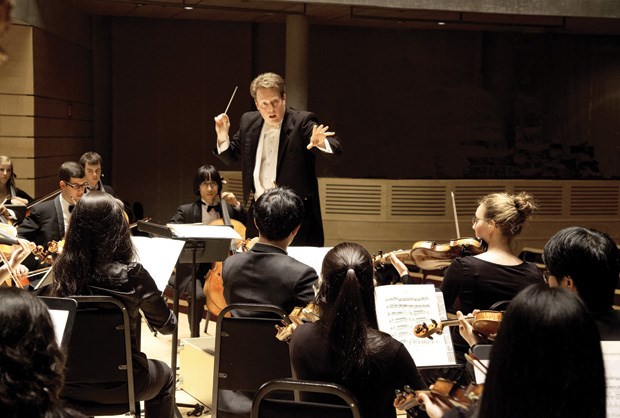The UBC Symphony Orchestra: The Great Romantics, Centennial Theatre, Saturday, March 15, 8 p.m.
Mozart looks different from 40,000 feet.
When circling something as complex as the famed composer's Linz symphony, conductor and pilot Jonathan Girard prefers to begin with an aerial view.
Girard is set to wield the baton for the UBC Symphony Orchestra this Saturday, as they play Strauss, Tchaikovsky, and Mozart's Symphony No. 36, also known as Linz.
Mozart tossed off the score in just four days - his genius obliviously humiliating Salieri in the process.
At first glance, the sheet music is as precise and as incomprehensible as a map of the cosmos.
But from that 40,000-foot perspective, Girard's work begins.
The details are not important at this stage. Girard is looking for the form of the piece, and for patterns within that form. Where does the introduction end? Does the exposition have a siciliano quality? What tempo would best suit the recapitulation? "Then, what I do, is I literally sing through the piece," he says.
As he sings the oboes and bassoons, the violins, viola, trumpets and timpani, the distance between conductor and composer starts to shrink.
"I start to form real opinions on what I think Mozart's ideas are," Girard explains.
Like poetry without punctuation, Mozart's music is generally sparse on notations, leaving the pacing, pauses, crescendos and diminuendos in the hands of his interpreters.
For the violinists and cellists, the way they hold the bow can be the difference between a period and an exclamation point.
An up-bow technique will result in a crescendo as the pressure point approaches the string, Girard explains.
Like an attorney building a case, Girard develops an increasingly definitive opinion of Mozart's intentions through his studies.
"Composers write in a language that continues to develop," he says. "The more I know about Mozart's output, not just the Linz symphony, but Requiem, his string quartets, piano concertis, all the other symphonies, it basically forms your opinion as a musician and you start to understand his language."
But after forming that opinion, he says the key is not to cling to it.
"As a conductor, you're not just inflicting what you think is correct. ... you have to be listening and absorbing what other people are offering, because often people can have a better idea than you do," he says. "There's this symbiotic relationship between you and the orchestra where sometimes you've giving and they're taking and then they're giving and you're taking."
By the time the show rolls around, the close-up perspective is gone, Girard says. "By the time we get to the performance, we're back out at the 40,000 foot level with: 'How do we sell this piece to the people that are sitting in the chairs and make them feel the emotion in the music. Because someone in the audience doesn't care if it's played up bow or downbow," he says. "But they want to know: 'What was Mozart really saying?" Born in Somerset, Massachusetts, Girard began playing the piano at age four.
"My grandfather was a pianist and he used to put me on his lap and away I went," he recalls.
His grandfather was a jazz player, tickling ivories in big bands across Massachusetts and Rhode Island.
He passed his perfect pitch and musical memory to his grandson.
"I think people have different gifts and this is mine," Girard says.
After learning the piano, he was drawn to the viola and even played saxophone in a meringue band, but Girard always had his eye on the man with his back to the audience.
"In fifth grade I was asking teachers about conducting," he says. "They let me conduct, even when I was in middle school."
Inspired by Leonard Bernstein's appearances on PBS, Girard came to understand the conductor as a music-maker without an instrument.
His background as a performer was crucial in creating empathy for what musicians go through, Girard says.
The orchestra consists of UBC doctoral and masters students, many of whom will have an impressive résumé once the concert series concludes.
The concert includes Don Juan, Strauss's tone poem for the doomed ladies man.
"Strauss is trying to tell the story of this guy, who has some interesting episodes to say the least," Girard says.
The music begins with an expression of Don Juan's virility.
"There's no weakness shown in the very beginning of that piece, and it's representational of just his pure charisma and force. It's actually one of the craziest, one of the most memorable openings of any orchestral piece that there is, and one of the hardest ones, too," he says.
Musicians auditioning for professional orchestras will be asked to play some of the extreme registers and lightning fast notes in auditions, Girard says.
As a teacher, part of his job is to prepare the next generation of musicians.
Poring over sheet music in a North Vancouver café, Girard recalls flying a singleengine Cessna.
Before he could take it out on his own, he had to simulate an emergency landing.
"We were almost at the tops of the corn," he says.
Like most everything for Girard, the experience relates to music.
"It's actually a lot like conducting an orchestra. When a plane is flying well it doesn't take much to manoeuvre it and it's the same thing with an orchestra," he says.



